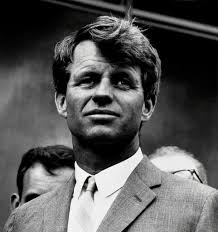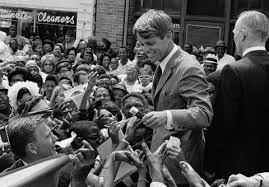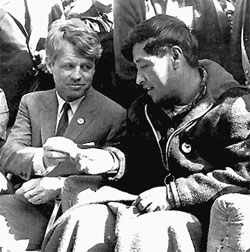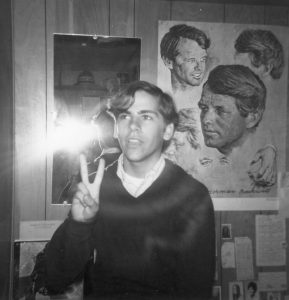
When you’re 17 and the world is shifting around you, when your hero is killed and the air seems charged with an ionic force that was never there before, it takes a long time to figure out what it means and how you’ve been changed by it all.
Bobby had the gift of empathy -- the ability to see the world through the eyes of the poor, the unrepresented. Whereas his opponent Eugene McCarthy was brilliant, professorial and cold, Bobby brought warmth, spontaneity and the charisma of a rock star.
That’s what 1968 was like for me. Martin Luther King, Jr. and Robert F. Kennedy were killed that year. In August Chicago Mayor Richard Daley sanctioned police riots at the Democratic National Convention and in November the unimaginable occurred when Richard Nixon, a wretched crook who was thought to be politically dead, was elected president.
I graduated from high school that year, and in the weeks leading up to the June 4 California primary I was an eager, idealistic volunteer in Robert Kennedy’s campaign for the Democractic Party nomination as President. My friend Geri Soto and I spent countless hours canvassing precincts, peddling Kennedy buttons and bumper stickers, nailing posters to utility poles and replacing them when Eugene McCarthy volunteers tore them down.
 One night during a fundraising rally at the Los Angeles Sports Arena, I briefly left the auditorium to find the men’s room. I was amazed to see Bobby standing alone in a wide corridor, apparently concentrating on the speech he was about to give. I hesitated – could that really be him? – and then approached him and shook his hand. Within seconds a dozen or more Kennedy supporters surrounded him and a pair of security guards rushed to Bobby’s side and whisked him away. There was a fervor and idolatry in Bobby’s fans — they responded to him in the same way I’ve seen fans respond to Bruce Springsteen or Leonard Cohen.
One night during a fundraising rally at the Los Angeles Sports Arena, I briefly left the auditorium to find the men’s room. I was amazed to see Bobby standing alone in a wide corridor, apparently concentrating on the speech he was about to give. I hesitated – could that really be him? – and then approached him and shook his hand. Within seconds a dozen or more Kennedy supporters surrounded him and a pair of security guards rushed to Bobby’s side and whisked him away. There was a fervor and idolatry in Bobby’s fans — they responded to him in the same way I’ve seen fans respond to Bruce Springsteen or Leonard Cohen.
A lot of people didn’t like Bobby. Among a certain liberal elite, it was fashionable to scorn him as a ruthless opportunist and exploiter of his brother John Kennedy’s legacy. After all, Bobby didn’t announce his candidacy until March 16, several months after Eugene McCarthy entered the race and showed that a peace candidate could successfully challenge the unpopular incumbent President Lyndon Johnson.
People were suspicious of a man who’d made the mistake of working for Senator Joseph McCarthy back in 1953. They cried nepotism when Bobby was appointed attorney general by JFK, and resented his election as U.S. senator from New York when his original home state was Massachusetts. What most people didn’t understand was how much he’d changed during his years of public service.
In his book Robert Kennedy: A Memoir, Jack Newfield described “the shock of unrecognition” that people often felt when they met him – the feeling that his gentle demeanor was at odds with the myth of his ruthlessness. In Harper’s magazine, David Halberstam wrote, “Most politicians seem attractive from a distance but under closer examination they fade; the vanities, the pettiness, the vulgarities come out. Robert Kennedy was different. Under closer inspection he was far more winning than most.”
Bobby had the gift of empathy – the ability to see the world through the eyes of the poor, the unrepresented, the victims of racial and social prejudice. That’s a rare commodity in a politician and one that can’t be faked. Whereas his opponent Eugene McCarthy was brilliant, professorial and rather cold, Bobby brought warmth, spontaneity and the charisma of a rock star.
During the last week of Bobby’s California primary campaign, my friend Geri and I drove to Los Angeles for a series of rallies at Kennedy campaign headquarters at the Ambassador Hotel. On Sunday night, June 2, we stood in the Embassy Ballroom of the hotel, surrounded by a sea of red, white and blue boaters and cheered when he quoted from George Bernard Shaw: “Some men see things as they are and ask ‘Why?’ I dream things that never were and ask ‘Why not?’ ”
 I was stunned by the wild enthusiasm of Bobby’s supporters and thrilled by the possibility of a victory in November. To watch him hold an audience was amazing. Bobby had a playful side, and I remember him teasing the crowd in a singsong-y voice, saying he couldn’t trust us to get out and vote. “After all, you’re the ones who elected Ronald Reagan governor.” “Oh no we didn’t!” came back the collective reply. “Oh yes, you did” he chided.
I was stunned by the wild enthusiasm of Bobby’s supporters and thrilled by the possibility of a victory in November. To watch him hold an audience was amazing. Bobby had a playful side, and I remember him teasing the crowd in a singsong-y voice, saying he couldn’t trust us to get out and vote. “After all, you’re the ones who elected Ronald Reagan governor.” “Oh no we didn’t!” came back the collective reply. “Oh yes, you did” he chided.
It chills me to write this, but I also remember thinking how vulnerable he looked in that ballroom – how easy it might be for some lunatic to take a shot. Throughout the campaign, Geri and I frequently heard the refrain, “Why waste your time? He’s gonna get killed just like his brother.” Those words seemed intentionally cruel, but when they became true no one was altogether surprised.
Two nights later, in the early morning hours of June 5, Bobby gave his victory speech at the Ambassador Hotel and was gunned down moments later. I was at home, and had gone to sleep before the late election returns. I didn’t hear the news until the following morning, when my mother told me at breakfast that Bobby Kennedy was lying in a coma. Roughly 18 hours later, he was gone. He was 42.
There was one week of school left, and I walked through my last days as a high school senior – final exams, commencement exercise, graduation – with a mixture of numbness, confusion and unarticulated grief. At 17, it’s hard to know how to mourn. I joined the Kennedy Action Corps that summer, a coalition of former RFK campaign workers, and canvassed my neighborhood collecting signatures on gun-control petitions. The assassination continued to haunt me. For months afterward, I fantasized how I might have personally prevented Bobby’s death by rushing forward to block Sirhan Sirhan’s bullets, had I been there that night.
After Bobby died, I’m sure I lost much of the idealism and trust I once had. And yet, despite the loss, I never grew sour on electoral politics; never stopped supporting progressive candidates and social-justice and environmental causes; never lost the conviction that each American deserves a stake in his country.
I was jubilant in 2008 when Barack Obama became president, crushed eight years later when a narcissistic charlatan staged a coup d’etat with voter suppression, lies and election hacking. It’s so easy to feel cynical and defeated and angry these days, and yet I’m hopeful the Democrats will regain control of the House and Senate in the fall. I’m grateful for my capacity to hope and to dream — that’s a big part of Bobby’s legacy.
An early version of this story appeared in the San Francisco Chronicle in 1988.





1968 was, as you say, a pivotal year and the world could not have changed more than it did when Bobby died. He was indeed a charismatic and empathetic man and inspired more passion and admiration than Gene McCarthy or Hubert Humphrey could ever dream of. And if Bobby could have run and won, how differently the world might have turned out. Thank you for sharing these personal and political memories. I love how he still inspires you, half a century later.
Such a moving and personal account of Bobby’s life and his tragic death. Your writing brought back memories of a more innocent time. I loved the picture of you giving the peace sign in front of the poster. A perfect and poignant accompaniment to this excellent piece.
I enjoyed reading this story. 1968 was also the year I turned 17 and graduated from high school, and was a major year in my life. However, I was a McCarthy supporter and had all those negative feelings about Bobby that you describe “a certain liberal elite” having. I was as passionate about Gene as you were about Bobby. But of course I was upset when he was shot – on the night I graduated from high school – and would have supported him enthusiastically if he had lived to become the Democratic nominee. Thanks for sharing these memories.
An amazing story. How remarkable that you had close proximity to Bobby Kennedy at such a pivotal point in both your lives. I was a true believer, loved everything Kennedy (I am a bit younger). I remember my clock radio awakening me with the terrible news in Michigan the morning after Bobby died. I pulled the covers over my head and wept. My mother came in to see why I hadn’t gotten up. All I could say was, “They got Bobby”.
A few years ago, I saw Rory Kennedy, the baby Ethel was carrying at the time, now a very good documentarian, introduce, then do a Q&A after the screening, about her first movie, “Ethel”. It was a warm and wonderful tribute to Bobby’s life partner and showed how she soldiered on with the eleven children after 1968.
This is a beautiful account. I didn’t know you’d campaigned for Senator Kennedy. You helped us feel as if we were there with you. Thank you for sharing your experience and your hope with us Edward. Coincidentally, I recently watched “Bobby Kennedy for President” on Netflix. I highly recommend it.
Thanks so much, Victoria. Very gratifying to receive this.